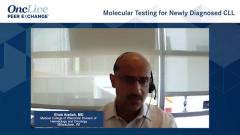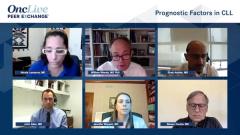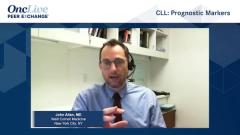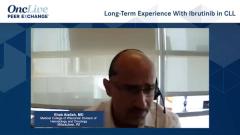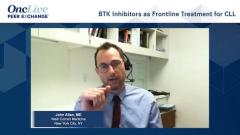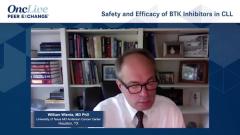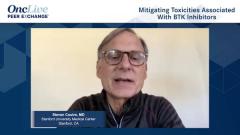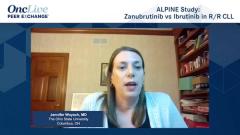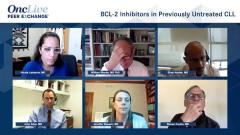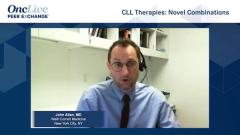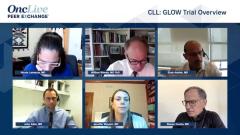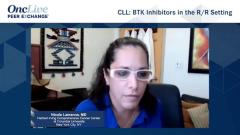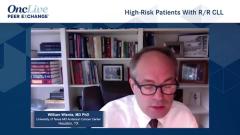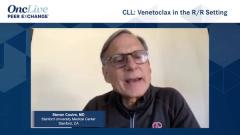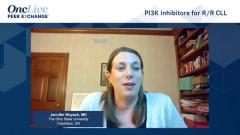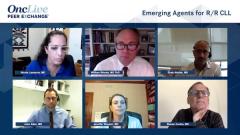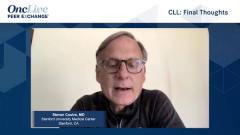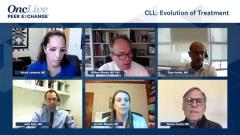
CLL: GLOW Trial Overview
Steven Coutre, MD, provides an overview of the phase 3 GLOW trial, as well as other novel and emerging combinations for the treatment of chronic lymphocytic leukemia (CLL).
Episodes in this series

William Wierda, MD, PhD: You mentioned GLOW [NCT03462719]. GLOW is a trial that's also being reported out at EHA [European Hematology Association Congress]. This is a frontline trial in an older population and younger patients who have comorbidities. It was a head-to-head phase 3 randomized trial of ibrutinib-venetoclax vs chlorambucil-obinutuzumab. Who's familiar with the data and is ready to give an assessment and make a comment on that study? Has anybody reviewed the data?
Steven Coutre, MD: Bill, I don't remember the numbers per se, but some people had an impression that the MRD [minimal residual disease] results weren't as stellar as we’d hope for. Certainly, compared with CAPTIVATE [NCT02910583], we have to be a little cautious comparing trials. There are differences in how they're measured and even how undetectable MRD is defined in terms of when it's obtained. But in the big picture, this is a regimen that will probably get approved in 2022.
Yes, that trial is older vs younger. I don't think that would make much difference. You'll make your decision about whether you use a time-limited combination as opposed to a continuous single BTK [Bruton tyrosine kinase] inhibitor in an older population on other factors, including cost in the Medicare population. I would caution about overinterpreting that data until it's more mature. There’s a trial, CLL17 from the European Consortium, that looks at ibrutinib vs venetoclax-obinutuzumab vs ibrutinib-venetoclax. For anybody who wants to see a proper trial prospective, we'll have to wait for that one.
William Wierda, MD, PhD: I'm excited about the combinations. I'm going to ask Jennifer for her thoughts on the new combinations, but I’ll first ask Dr Atallah about his experience with TLS [tumor lysis syndrome] management and his thoughts on this debulking concept. What have been the practical challenges you've experienced with venetoclax initiation and ramp-up?
Ehab Atallah, MD: After giving patients obinutuzumab, they usually have debulked enough that we don't really see TLS. We still follow the rules overall. Patients have to come in with each ramp-up, especially for the first 2 ramp-ups. They have to come in on days 1 and 2 to get their blood checked. We are fortunate enough to have enough hours in our outpatient to be able to do that. Other than the frequent visits and the need for extended hours, it's really doable for patients starting out with venetoclax and then Rituxan, which is the way MURANO [NCT02005471] was done. We've had to admit a few patients for a couple of days on days 1, 2, 8, and 9 to manage that, especially when they have bulky disease, but it’s doable overall.
William Wierda, MD, PhD: Jennifer, let's finish up our frontline conversation with your thoughts. There are a lot of new trials, including ongoing phase 2 trials and combination trials. What are you most excited about and interested in? Where are you looking for the field to go in the future in terms of first-line therapies?
Jennifer Woyach, MD: Just as we saw with BTK inhibitor monotherapy, we had ibrutinib, then we had multiple other covalent inhibitors, and now we're seeing the results of combination studies with acalabrutinib and zanubrutinib with venetoclax, and sometimes with obinutuzumab as well. That makes sense for these combinations, too, given the addition of antibody potentially helping some of those second-generation inhibitors.
The tolerability of those drugs compared with ibrutinib makes it very appealing to look for those in combination regimens in the future. Certainly, the short-term data we've seen is really exciting. It's hard to say if there’s much difference in the undetectable MRD rate. With the zanubrutinib study, it looks like there might have been. That was zanubrutinib and venetoclax-obinutuzumab. But with trial to trial comparisons, it’s hard to say for sure. But we’re certainly seeing high rates of minimal residual disease. We see a lot of patients get all of their treatment and the short-term PFS [progression-free survival] looks very exciting.
William Wierda, MD PhD: Great. There are a lot of ongoing phase 3 trials. We'll see a lot of data coming out in the next 3 to 5 years. Hopefully that will lead us toward a cure in CLL [chronic lymphocytic leukemia]. I'm very optimistic about that.
TRANSCRIPT EDITED FOR CLARITY


